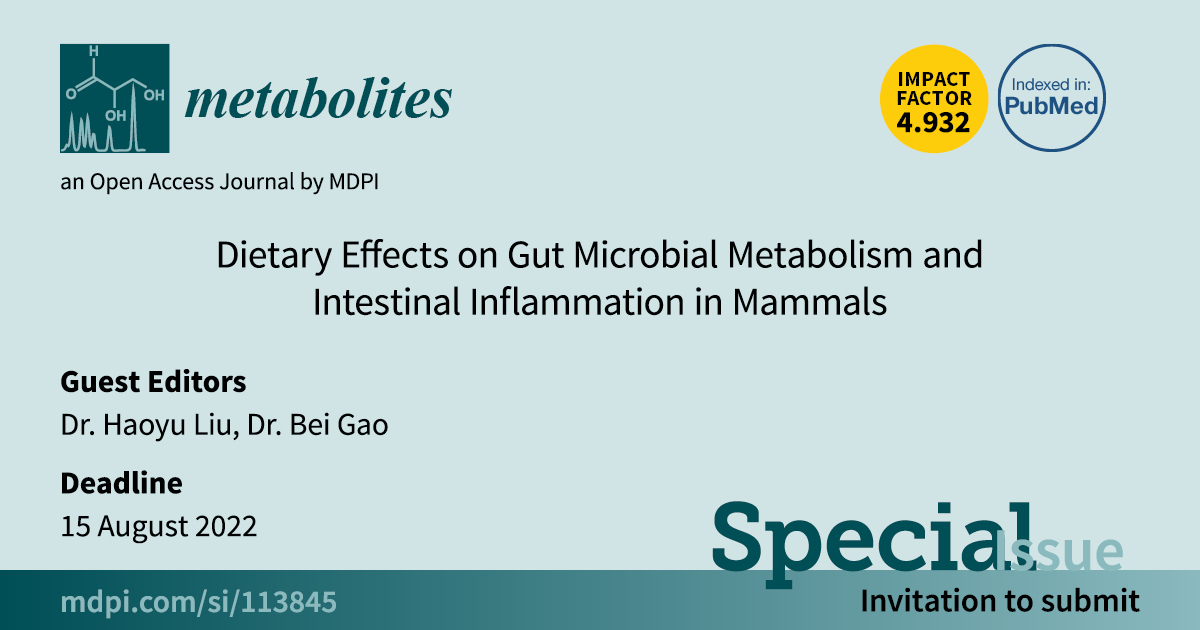Dietary Effects on Gut Microbial Metabolism and Intestinal Inflammation in Mammals
A special issue of Metabolites (ISSN 2218-1989). This special issue belongs to the section "Microbiology and Ecological Metabolomics".
Deadline for manuscript submissions: closed (15 August 2022) | Viewed by 13589

Special Issue Editors
Interests: dietary intervention; inflammation; mucosal immunology; nutrigenetics
Interests: metabolomics; lipidomics; stable isotope tracing; gut microbiota; multi-omics; environmental toxicology; alcohol-related liver disease
Special Issues, Collections and Topics in MDPI journals
Special Issue Information
Dear Colleagues,
Gut microbial metabolites tremendously impact the health of their host, such as short-chain fatty acids, polyamines, polyphenols, bile acids, trimethylamine N-oxide, and vitamins. Metabolomics is an essential perspective through which interactions among diet, gut microbiota, and intestinal inflammation in mammals can be explored. Given that gut microbial metabolism plays an significant role in mammalian health, this Special Issue of Metabolites is dedicated to publishing state-of-the-art research that reveals the dietary effects of gut microbial metabolites on gut microbial metabolism and intestinal inflammation using untargeted and targeted metabolomics and lipidomics approaches; nutrigenomics; tracing the fate of gut microbial metabolites using stable isotope tracers; identifying novel gut-microbiota-derived metabolites and lipids using cheminformatics; and unravelling microbial enzymes and key genes involved in the conversion of metabolites and lipids by integrating metabolomics and lipidomics with other -omics.
Dr. Haoyu Liu
Dr. Bei Gao
Guest Editors
Manuscript Submission Information
Manuscripts should be submitted online at www.mdpi.com by registering and logging in to this website. Once you are registered, click here to go to the submission form. Manuscripts can be submitted until the deadline. All submissions that pass pre-check are peer-reviewed. Accepted papers will be published continuously in the journal (as soon as accepted) and will be listed together on the special issue website. Research articles, review articles as well as short communications are invited. For planned papers, a title and short abstract (about 100 words) can be sent to the Editorial Office for announcement on this website.
Submitted manuscripts should not have been published previously, nor be under consideration for publication elsewhere (except conference proceedings papers). All manuscripts are thoroughly refereed through a single-blind peer-review process. A guide for authors and other relevant information for submission of manuscripts is available on the Instructions for Authors page. Metabolites is an international peer-reviewed open access monthly journal published by MDPI.
Please visit the Instructions for Authors page before submitting a manuscript. The Article Processing Charge (APC) for publication in this open access journal is 2700 CHF (Swiss Francs). Submitted papers should be well formatted and use good English. Authors may use MDPI's English editing service prior to publication or during author revisions.
Keywords
- metabolomics
- lipidomics
- stable isotope tracing
- gut microbiota
- multi-omics
- environmental toxicology
- alcohol-related liver disease
Benefits of Publishing in a Special Issue
- Ease of navigation: Grouping papers by topic helps scholars navigate broad scope journals more efficiently.
- Greater discoverability: Special Issues support the reach and impact of scientific research. Articles in Special Issues are more discoverable and cited more frequently.
- Expansion of research network: Special Issues facilitate connections among authors, fostering scientific collaborations.
- External promotion: Articles in Special Issues are often promoted through the journal's social media, increasing their visibility.
- e-Book format: Special Issues with more than 10 articles can be published as dedicated e-books, ensuring wide and rapid dissemination.
Further information on MDPI's Special Issue polices can be found here.







